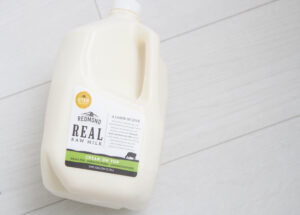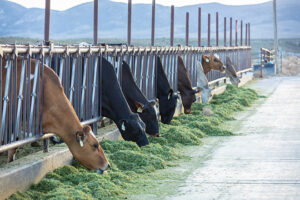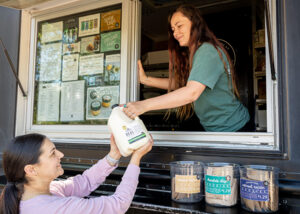You’ve probably herd (get it?) of A2 milk. Whether you’ve been part of the conversation for a while or just noticed the term on our Instagram, you might have questions about what A2 milk even is, its potential for your health, and how it fits into our approach to bringing you the best raw milk.
We want you to be able to make informed choices for your health, so here’s what we do know about A2 milk, our take on the A1/A2 debate, and what we’re doing about it.
First Things First: What Is A2 Milk, Anyway?
It’s all about the protein present in milk.
Here’s a quick nutrition lesson:
Milk contains two types of protein: whey and casein.
Casein makes up around 80% of the protein in cow’s milk.
There are also casein subtypes. One of these subtypes, called beta-casein, makes up about 30% of the protein in cow’s milk.
This is where the A2 factor comes in because there are two forms of beta-casein: A1 and A2.
It’s thought that A1 beta-casein causes the production of an opioid peptide called beta-casomorphine-7, or BCM-7, which may create inflammation in the gut. (And we all know that inflammation can contribute to a long list of diseases.) BCM-7 can also cause digestive issues.
In fact, some researchers believe that BCM-7, not lactose, is the culprit behind many people’s trouble digesting cow’s milk.
However, an amino acid in A2 milk called proline may actually prevent the production of BCM-7, which can make it easier for some people to digest and less likely to cause inflammation in the body.
The molecular structure of A2 milk also more closely resembles that of human breast milk, which could have implications on how it’s processed by the human body.
Finally, while most milk you find in the store is A1 or a blend, A1 milk is a relatively new thing. It’s believed that historically, cows have produced primarily A2 milk, and have only started producing A1 since the advent of large-scale agriculture.
The type of beta-casein in milk depends on the cow’s natural genetics. This isn’t something you can produce with hormones or drugs. Some cows naturally have the A1A1 gene and produce primarily A1 beta-casein, while some have the A2A2 gene and produce only or mostly A2. Most cows have the A1A2 gene and produce a blend of the two.
The only way to find out which gene cows carry is to test them. Once they know what they’re working with, farmers can then practice selective breeding to produce an A2 herd.
Also, certain breeds are more likely to carry the A2A2 gene than others. Breeds like Swiss Brown, Jersey, and Guernsey cows tend to fall within that category and are more likely to have the A2A2 gene than Holstein cows, which are most commonly used in widescale dairy production due to their high milk production rates.
Things to Know About A2 Research
Though we can make speculations based on the molecular structure of A2 milk, there’s still minimal human research on the effects of A2 milk, and more data is needed to reach a solid conclusion. There are also many other variables that need to be tested, because beta-casein, though the dominant protein in cow’s milk, is just one of many proteins that vary from cow to cow.
It’s also worth noting that most of the existing research was funded by the A2 dairy industry.
We don’t want to discount anecdotal evidence, however, (every body is different) and we are excited to see the research develop.
Our Thoughts on the A2 debate:
With A2 milk resembling human breast milk and historically being the primary form of cow’s milk, we think that A2 milk is very likely a more natural, healthy way to consume cow’s milk.
Though more data is needed, we’re feeling optimistic that this could be an option for those who have trouble digesting cow’s milk.
At Redmond Farms, we strive to produce food as close to its natural, original state as possible, so we’re watching the research and adjusting our practices accordingly.
Quality Is Our Goal
We’re proud to say that our dairy herd is 100% A2. When we first learned about A2 milk, we were already pretty close to having an A2 herd due to the breeds we selected. Since then we’ve taken the extra steps to genetically test our herd, remove the cows with an A1 gene, and only breed or keep cows with the A2A2 gene.
But the A2A2 gene isn’t the only thing we breed for, or even our top priority when it comes to breeding. Different cow breeds produce different qualities and quantities of milk, and we find that diversifying our herd with several heritage breeds (as well as some good old, high-producing Holsteins) makes for top-quality milk with good cream content and lots of healthy fats and other nutrients.
Is A2 Milk Right For You?
While there are still other factors to explore and lots more research to be done, we’re cautiously optimistic about the implications of A2 milk on human health and digestion.
However, here’s what we suggest for you:
Read the studies to develop your opinions.
Look at the research that does exist and be aware of potential biases and holes in the data. Right now, the research is limited, but it’s best to look at what’s out there and see what the experts are saying (we listed a few resources at the bottom of this article to get you started.)
Listen to your body.
If you notice that you seem to digest A2 milk better than other milk, great! A2 is probably a good choice for you. But if you notice adverse effects, then obviously it’s not your best option. You know your body best!
Note: If you have a severe dairy allergy or are severely lactose intolerant, the structure of the protein in milk won’t make much difference. Work with your doctor to determine whether A2 milk would be safe for you to try.
To A2 or Not to A2?
If you do decide that A2 milk is a good choice for you and your family, rest assured that in addition to being organic, grass-fed, and high in nutrients and helpful enzymes, our milk is also A2 thanks to our breed selection.
As the research develops, we keep an eye on the studies and adjust our care accordingly. We continue to maintain our high care standards to produce the healthiest milk available. And if we can produce milk that may be an option for those with dairy troubles, even better!
Sources:
The benefits and risks of A2 milk—Medical News Today.
What Is a2 Milk?—Consumer Reports.
A2 milk and A2 genetics—University of Minnesota Extension.
What Is the Difference Between A2 Milk and Regular Milk?—MedicineNet.







